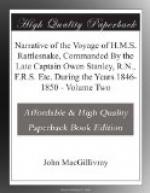A short distance to the south-west of our camp, is a range of round hills, of moderate height, covered with grass, and thinly timbered with box and other species of eucalyptus, resembling the ironbark. These hills are composed of huge blocks of coarse granite, with a stiff soil, and appear to stretch a long distance to the west.
July 1.
Mr. Kennedy returned this morning, having explored the country for about forty miles, over which he thought we might travel safely. There being plenty of grass however at the camp, and the men no better, he determined to defer our advance till Monday.
July 2.
Being Sunday, prayers were read at eleven o’clock.
July 3.
Early this morning we prepared to start, but Luff and Douglas being seized with a fit of ague, we were compelled to stop. Although our horses had all the way had abundance of feed, they began to grow very thin—several of them very weak, and one getting very lame, from bad feet. The sheep also had fallen away very much, which I attributed to the wet journey they had had; being almost always wet, from crossing rivers and creeks.
July 4.
Mr. Kennedy and three others roamed this morning to some distance from the camp, when they were followed by a tribe of natives, making threatening demonstrations, and armed with spears; one spear was actually thrown, when Mr. Kennedy, fearing for the safety of his party, ordered his men to fire upon them; four of the natives fell, but Mr. Kennedy could not ascertain whether more than one was killed, as the other three were immediately carried off into the scrub.
July 5.
Luff and Douglas now began to get better, but being still unable to walk, we could not break up our camp.
July 6.
We started early this morning, and crossed two creeks with narrow belts of scrub on each side, running north-east. I have little doubt these creeks run into the river we crossed on the 8th of June. The banks of the second creek were nearly twenty feet high, so that we were obliged to lower down the carts into its bed by means of ropes and pulleys, fastened to the branches of the trees which overhung the creek. The horses were got into the creek with a great deal of difficulty, then harnessed to the carts, and we proceeded along the bed of the creek till we arrived at a spot where the banks on the opposite side were not so steep. At this place by harnessing six horses to each of the carts, we managed to get them all out of the creek without any accident. The bed of the creek was composed of granite pebbles. We encamped on the northern side of it, the soil being a strong clayey loam, well covered with grass two or three feet high, so thick that it was difficult to walk through it. The country here was hilly open forest-land, with a high range before us, running north-east. The trees were principally Moreton Bay ash, box, and another species of eucalyptus, resembling the common ironbark,




